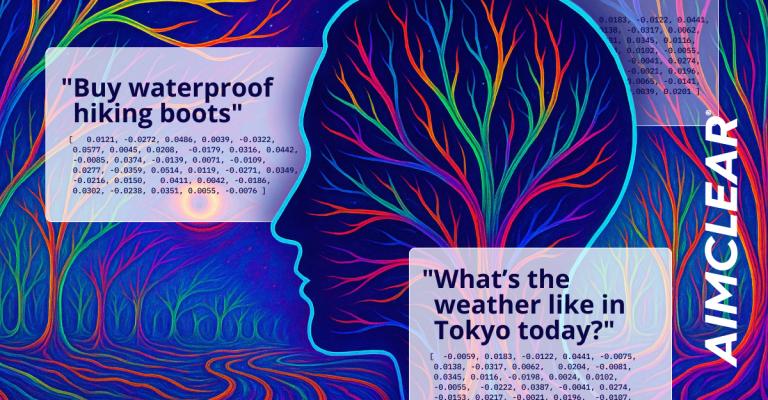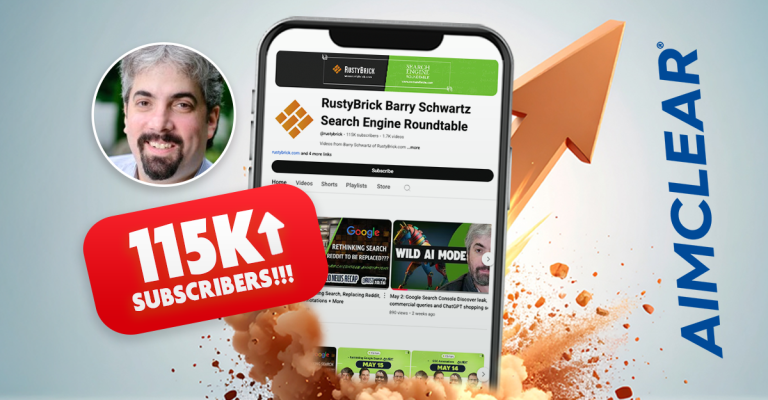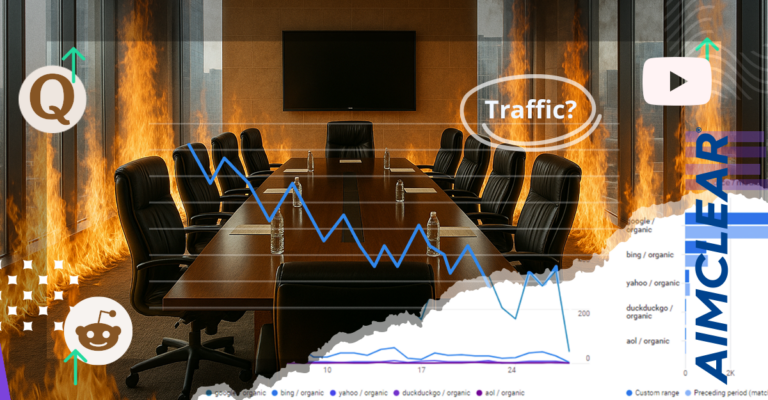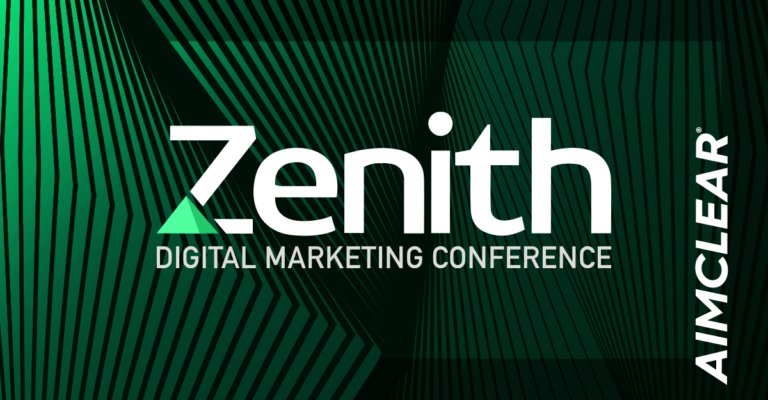Rand Fishkin (Spark Toro Founder & SEO top dog) has the coolest SEO data and intriguing insights. Sadly, his predictions have come true: Less than half of Google searches now result in an outbound click. It’s not surprising.
AIMCLEAR, as an integrated agency, has been preparing for Google to diminish clicks to websites, therefore honing a channel agnostic approach treating paid search brand ad site links as a surfaced navigation bar to the destination website. We run ads, even brand ads, because these days SEO in a silo is less effective.
Some marketers believe Google’s hold on traffic is unfair, for a variety of reasons. Some media and government types think Google’s distribution stranglehold is illegal. In general, the power and control tech companies hold over markets has become a hot-button issue.
SEOs are Hurting
From a search engine optimization (SEO) perspective, marketers are not happy. Here are some common complaints:
COMPLAINT: It’s hard for the little company to get its start if they can’t afford to buy Google Ads to compete with big brands.
REALITY: Yeah, it hurts, AND the last 20 years or so have been an anomaly in the history of advertising technology. Only in this generation of marketers were we able to gain huge exposure via free brand traffic from the same platform as paid ads. It was remarkable and temporary, a blip in marketing history.
Think about it: lucrative advertising inventory to drive store traffic, phone calls, etc. was rarely, if ever, free for startups, unlike the last 20 years with the search engines.
When the printing press was invented, printers did not line up to offer startup entrepreneurs free ink and paper. Since we never had free access to printing presses at scale, nobody knew to complain when we lost it.
Newspapers had only the smallest business buzz columns and didn’t simply give away sports or entertainment section display space. Free real estate ads? Nope. Startup realtors needed to buy classifieds or find a way to make actual news.
Television and radio stations donated PSAs (public service announcements) sparingly, usually when the sales staff was unable to sell available on-air inventory or because of government requirements.
We’ve been spoiled. The last 20 years were a perk for early adopters. Some of us are kicking ourselves for having not built audiences for free while we had the chance. Because not every product space is competitive, there will be an SEO opportunity of a certain girth. There’s always the informational long tail. Let’s take what we can get while building our brand in other channels and make as good a partnership as Google will allow.
COMPLAINT: Google surfaces and monetizes valuable third-party website content (yours & mine), stealing post-click on-site revenue. Think about weather sites, travel, hotels, playable podcasts, songs, Wikipedia, videos, etc., all of which now are provided right on the search results page with no need for a further click.
REALITY: Yeah, this is a hard pill to swallow. It’s likely Google nets a pretty penny with each successful flight referral, hotel booking, and extra time-on-Google in the walled content garden. If you’re the airline brand dealing with fewer website visits and direct bookings because flights data is surfaced on Google, that’s a tough one to deal with.
Develop Alternate Channels?
OK, so why doesn’t Delta or United Airlines tell Google to piss off and refuse to participate in the G Flights brand hijacking scheme? Well, Delta still gets exposure on Google. Airlines have been paying booking commissions since travel agents. Why does Delta care whether Expedia gets the referral fee vs. Google?
I suppose we all have the option to remove our sites’ pages, data, and feeds all the way out of Google. We can refuse to supply our organic content. Then, don’t buy any ads to further repudiate Google. Accuweather has any number of “free” channels to market in. Perhaps they can put bulletin board fliers in laundromats. That’s about the quality of most free inventory out there, other than SEO.
Here’s what well-known SEO Ryan Jones had to say:
We need to stop approaching this issue with the myopic view of an SEO and start thinking like a user. Gone are the days where searchers expected a list of websites. Sure some searchers are looking for websites, but others just want an answer or help accomplishing a task.
Is SEO dead? Yes – as we knew it. But that’s ok because it’s being quickly replaced by SEO as we should be doing it; as part of a full scale marketing plan.
COMPLAINT: Affiliates and aggregators of all sizes are squeezed out. Instead, Google is a massive super-affiliate, the ultimate meta-aggregator, aggregating aggregators.
REALITY: Painful yes. It’s hard to think that SEO in-part may be a channel changing in availability with tech progression. Should Netflix have been subject to harsh rhetoric and regulation because streaming services blew Blockbuster off the face of the earth? Maybe. How about parking lot attendants, robot cashier manufacturers, or ATMs that replaced some attendants and bank tellers?
This is a hard question. SEO is important because it speaks to how we frame our wares in human language.
SEO is in no danger of going the way of Blockbuster or parking lot attendants. But we can’t deny that Google’s ever-rising wall around its garden means SEO must adapt, and that adaptation includes a deeper integration with the rest of marketing, including paid options.
Some people say aggregators don’t offer near as much value vs. an integrated, full search experience, with huge amounts of other related data at hand. Orbitz does not have YouTube to search about trailhead water supplies, time zone calculations, and electrical adapters in Switzerland — all data Google can integrate.
Travelocity could not hope to offer the same level of flights-associated airport restaurant review data as Google UK can. It may just be that mainstream, huge category, smaller-than-Google affiliates can’t compete with Google, the ultimate super affiliate.
COMPLAINT: Our best friends could go out of business, forced to evolve, employees reassigned or laid off.
REALITY: The best dedicated SEOs will survive. I can think of dozens of amazing SEOs who will. Others may be forced to diversify with integration in other marketing channels.
SEOs, insulate yourself from change by further integrating with brand, PR, paid search/social, programmatic top of funnel display, retargeting/remarketing, organic social, integrated creative, sales, etc. The new SEO is truly integrated.
COMPLAINT: Google squats on brands’ copyrights, exploited to fuel advertising products from which Google profits greatly…and we don’t.
REALITY: This is a deeper issue and speaks to an implied contract some marketers believe we have with Google. This article is not about the right or wrong of what’s happening, only that it’s happening. We don’t deny there could be a moral/ethical issue at stake here that deserves attention, but in this article we want to concentrate on how we can prosper in the meantime.
However, I asked a couple of SEOs I deeply respect to give their takes on this issue, as I know it is one they and others who focus on organic traffic from Google care about deeply:
I can go as far back as [Google’s] acquisition of ITA Software in 2010 where Shahid Awan and I talked back then about how Google was usurping independent service providers. So now Google just marches ever further along the ‘keep them on Google’ business model. My responsibility, however, is to help clients maximize whatever opportunity exists today. Adapt or die. Yet I also understand the boiling-over frustration in our industry given how egregious Google’s actions are in abuse of their monopoly. – Alan Bleiweiss
SEO is about understanding where user query and intent meet, and how to make that connection in a way that leads to ROI. Google’s quest to dominate the internet and their unhealthy push into essentially stealing content interferes with that process. Of course, we have to adapt to this as SEOs, but that doesn’t make it legally or ethically ok, and it does great damage to the original concept that the World Wide Web is supposed to be a level playing field. – Jenny Halasz
COMPLAINT: We have a right for search engines to list our brand prominently.
REALITY: Assuming we have a “right” is dangerous. In reality, at present there are no laws to support this position. That’s bad news. SEO or paid has become a nasty decision because paid brand keyword ad units perform better than organic in many cases. Commonly, paid search brand replacement ads outperform organic-only dramatically, an average of ~1.7X after cannibalization of the organic result. That’s money lift, people, not just traffic.

More efficient navigation from #PPC sitelinks drills deeper into pathways to purchase. We get substantially better creative control than most organic SEO results buying ads. Creative snippet rotation testing in dynamic ad units kicks ass. Overall, buying brand keywords is far superior. If not, fix your brand creative. Something’s wrong.
SEO Myth & Wisdom
It’s a fallacy that SEO sends “free” traffic. SEO costs money too–gobs of it–to audit, strategize, fix sites, create content, monitor, rinse and repeat. We still need to do that for whatever opportunities will continue to exist. Some sites just can’t make a meal of SEO-only all the time.
Since the beginning of the Internet, every channel, platform, community, engine, network, etc. that gave marketers free, commerce-driving, above-the-fold inventory, took it back and charged marketers for advertising. Same as it ever was. Same as it always shall be. It’s sad that his is what happened with Google, if not expected.









